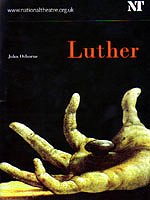|
Loading
|
|
|
Luther
Olivier (National Theatre)
What's on Stage review by Gareth Thompson, 8th October 2001
 It
takes some nerve on director
Peter Gill's part to place his leading man (Rufus
Sewell) with his back to the audience for the opening five minutes. Only
Sewell's tonsured wig is visible initially, but he grows forcefully into the
part of 16th century radical Martin Luther.
It
takes some nerve on director
Peter Gill's part to place his leading man (Rufus
Sewell) with his back to the audience for the opening five minutes. Only
Sewell's tonsured wig is visible initially, but he grows forcefully into the
part of 16th century radical Martin Luther.
John Osborne's 1961 drama is a marathon three-hour piece, and only the National's resources could have assembled a cast of this quality to do it justice. Alison Chitty's marbled, monastic sets echo with ascetism, whilst live music and deeply resonant ensemble singing lend the evening a meditative temper.
The thrust of Luther's stance decreed that faith could endure irrespective of religious orthodoxy, and that peddling guilt for profit corrupted the churches themselves. Such an attitude would doubtless have found favour with the anarchic Osborne, but by and large he leaves the script free of unrestrained angst.
Sewell lives and breathes the role for every second. Whether scrubbing floors with a zealous vigour, or in the grip of palsied torment, his performance keeps you riveted. Geoffrey Hutchings as the gruff, disappointed father leads the comic exchanges with a flourish. 'Too much wine? I could drink this monk's piss from here to Gabriel Hall!' he storms indignantly.
Equally striking is Richard Griffiths' role as the tainted Johann Tetzel. Explaining the church's sale of bonds to the living or dead to spare their damnation, he engages the audience like a stand-up genius. Almost pantomime in its gross campfoolery, it's a turn that won an ovation of its own, with Griffiths clearly enjoying himself hugely.
But it's the growth of Luther from convulsed striver to self-justified opposer that we're there to concentrate on. 'You always talk as if lightning were about to strike behind you,' he is advised. A soul in torment, seeking release, it isn't until he replaces monastic monotony with college contemplation that his mind begins to soar. A sagacious Timothy West becomes his confidant and adviser, although Luther's obsessions with ailments of the body and spirit prevail throughout.
Wisdom is fashioned into Osborne's script like ripples in the Christ carving that's hung aloft. The playwright loved a good rant, and the pulpit scenes end with the front rows taking cover from a hail of frothy phlegm. But the anger is well-directed, against notions of state and church control, whilst introducing enough doubts to balance the issue against Luther.
Sewell is awesome throughout. How does his voice stand up to it, you ask yourself? 'To go against one's conscience is neither safe nor honest,' pleads Luther, with Osborne's wrathful face swimming into view. If only some ire could have been spent on the audience, whose endless coughs and sneezes spread diseases all night long. A plague upon their houses — if there isn't one already.
Mystic, hypochondriac and doubter. Osborne and Sewell present us with all these options, whilst preserving the man who offered wholesome original blessing over wholly original sin.